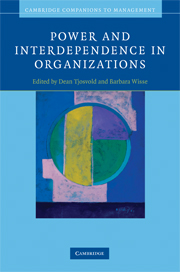Book contents
- Frontmatter
- Contents
- List of figures
- List of tables
- Foreword
- Introduction
- I Relationships to manage the faces of power
- 1 Understanding power in organizations
- 2 How can power be tamed?
- 3 Power and self-construal: How the self affects power processes
- 4 The conceptualization of power and the nature of interdependency: The role of legitimacy and culture
- 5 Power in cooperation and competition: Understanding the positive and negative faces of power
- II Participative leadership: Leading with others
- III Exchange dynamics and outcomes
- IV Power to influence
- V Leading with values
- Index
- References
2 - How can power be tamed?
Published online by Cambridge University Press: 19 January 2010
- Frontmatter
- Contents
- List of figures
- List of tables
- Foreword
- Introduction
- I Relationships to manage the faces of power
- 1 Understanding power in organizations
- 2 How can power be tamed?
- 3 Power and self-construal: How the self affects power processes
- 4 The conceptualization of power and the nature of interdependency: The role of legitimacy and culture
- 5 Power in cooperation and competition: Understanding the positive and negative faces of power
- II Participative leadership: Leading with others
- III Exchange dynamics and outcomes
- IV Power to influence
- V Leading with values
- Index
- References
Summary
Power is essential for any successful human organization, whether a family organized for mutual material and emotional support, an economic enterprise organized for the production and distribution of goods and services, or a political structure organized to keep the peace and create cooperation among diverse groups. Yet any serious analysis of power immediately confronts its dual nature: On the one hand, power makes it possible to coordinate human activity so that organizations can accomplish what individuals cannot. That coordination requires people who have the desire and skill to seek power. As Russell (1995: 190–191) argued, “democracy, if it is to exist psychologically as well as politically, demands organization of the various interests […] by men who enjoy whatever influence is justified […].” Moreover, the power of charismatic leaders can make us feel that “our hearts burn within us, while he talked with us by the way” (Luke 24:32; see also House et al. 1991; McClelland and Burnham 1976).
On the other hand, power can destroy: turning persons into dehumanized objects (Kipnis 1976), leaders into demagogues, and organized society into a totalitarian prison. Hitler was only the most memorable of the many charismatic leaders who led their people to aggressive war. As Bertrand Russell (1995: Chapter 18) argued, taming power is the central moral and ethical problem of human social existence – a concern to the ancient Confucians and Greeks and a leitmotif of Western social science, from organizational theory and normative political science to laboratory experimentation in psychology (Lee-Chai and Bargh 2001).
- Type
- Chapter
- Information
- Power and Interdependence in Organizations , pp. 33 - 51Publisher: Cambridge University PressPrint publication year: 2009
References
- 3
- Cited by

